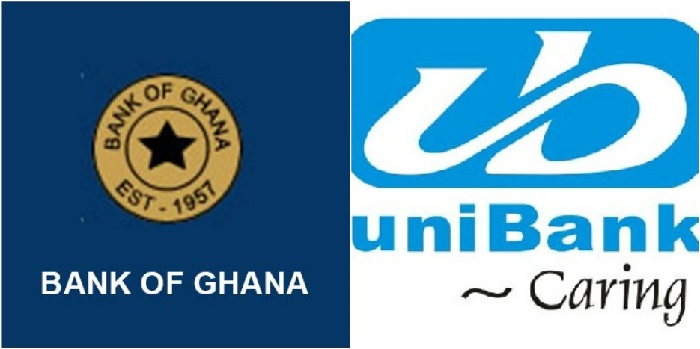The Bank of Ghana today March 20, 2018, took over the management of Ghanaian owned bank, UniBank as part of measures to save the local bank from imminent collapse.
In a press conference, the Governor of the Bank of Ghana, Dr Ernest Addison said under Sections 107 and 108 of the Banks and Specialised Deposit-Taking Institutions Act, 2016 (Act 930) the Bank of Ghana has effective March 20, 2018 appointed KPMG as the official administrator for UniBank Ghana Limited.
These are the 8 major reasons why the central bank took over uniBank.
1. uniBank persistently maintained a capital adequacy (CAR) ratio below zero (currently negative 24%), making it technically insolvent. This contravened the 10% minimum CAR required.
2. uniBank suffered liquidity shortfalls and consistently breached its cash reserve requirement. As a result, UniBank relied extensively on liquidity support of over GHS 2.2 billion from the Bank of Ghana over the past two years to meet its recurring liabilities.
3. uniBank conducted its credit administration in a manner that has jeopardized the interests of depositors and the financial sector as a whole.
4. uniBank failed to comply with a directive of the Bank of Ghana dated 26th October 2017, under section 105 of Act 930, prohibiting the bank from granting new loans and incurring new capital expenditures.
5.uniBank failed to comply with several other regulatory requirements, including Lending to a number of borrowers in excess of its regulatory lending limit (single obligor limit).
6. uniBank was borrowing from the inter-bank market without the written approval of the Bank of Ghana when its CAR was less than the prescribed ten percent (10%), in breach of the BoG laws.
7. uniBank was outsourcing a number of services such as those of tellers, receptionists, and security, to affiliate companies without the prior approval by the Bank of Ghana, contrary to BoG Laws.
8. uniBank refused to cooperate with the Bank of Ghana in the performance of its supervisory responsibilities, including deliberately concealing some liabilities from its balance sheet, and failing to submit documents and records for supervisory inspection.





